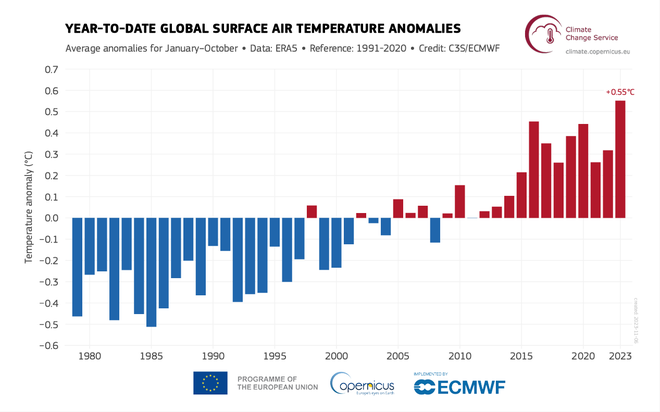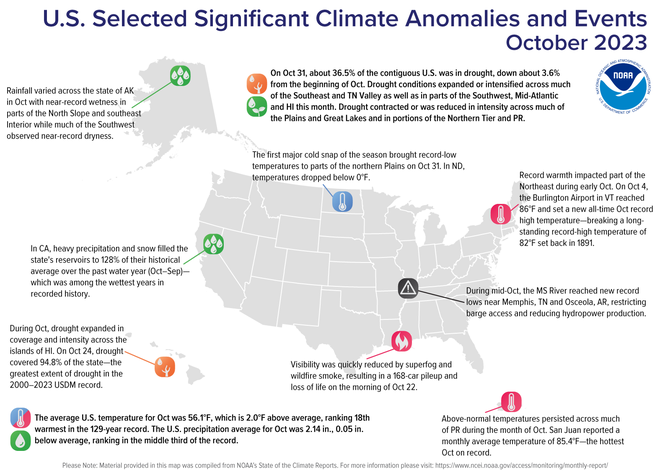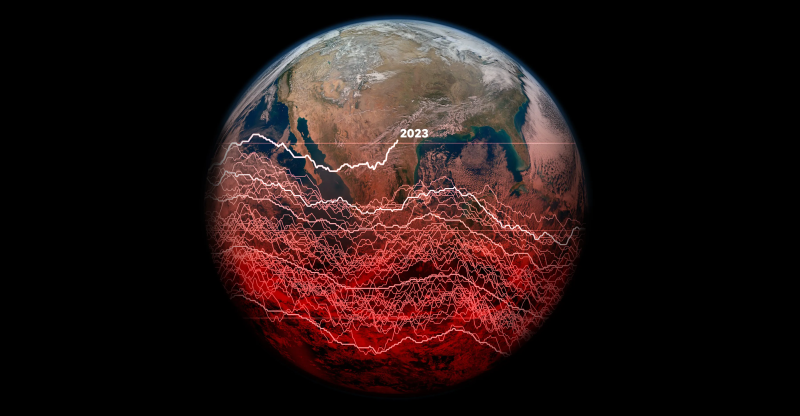Add another heat record to the pile: Earth is historically and alarmingly hot. Now what?
Global average temperatures reached new highs over the past 10-12 months, notching new records in the steady march of a warming climate, two national groups announced last week.
It's been warmer than at any time in recorded history and was likely warmer than any other time in 125,000 years, an analysis by Climate Central concluded. The Copernicus Climate Change said it's also "virtually certain" that 2023 will be the hottest year in recorded history.
If these and other announcements detailed below sound familiar, it’s because heat-related records are being set and broken, over and over again, month after month and year after year in cities, states and countries around the world.
None of this should be surprising, said Andrew Pershing, vice president for science at Climate Central, a nonprofit that reports climate change news. “We should expect to set records because we live on a warming planet. We have too much carbon dioxide in the atmosphere.”
Heat – and cold – records have been set since people first started keeping track of temperatures, but today warm records occur far more often than cold records, and in dizzying variety. Individually they're not always attention grabbing, but considered en masse, they present a piercing look at how steadily rising temperatures affect how we live, work and play.
All of the warming is “in line with earlier predictions,” says Michael Mann, author of the new book “Our Fragile Moment” and a professor of Earth and environmental science at the University of Pennsylvania. “Some of the impacts however, such as extreme weather events, are exceeding the predictions."

Climate Central issues report
The global average temperature for November 2022 to October 2023 was 1.32 degrees Celsius above a pre-industrial baseline, Climate Central reported last week, using a method it calls the Climate Shift Index to calculate the days of above average temperatures that can be linked to climate change.
Here's what Climate Central says its findings mean for people:
- Over the 12 months, 7.3 billion people, 90% of the world's population, experienced at least 10 days of temperatures strongly affected by climate change.
- 5.8 billion people were exposed to more than 30 days of temperatures made more likely by climate change.
- An estimated 1.9 billion people experienced at least one five-day heat wave over the 12 months.
Warmest October on record

Copernicus, a weather and climate service for the European Union, also announced:
- October was the warmest October on record
- The global temperature was the second highest of all months, behind September 2023.
- Year to date, the global mean temperature is the highest on record, 1.43 degrees Celsius above the pre-industrial measure.
Visualizing the changing climateGlobal warming's impact on Earth explored
2023 one of the top two warmest so far in 10 states
The National Oceanic and Atmospheric Administration announced new records this week:
- Four southern states – Florida, Louisiana, Mississippi and Texas – are seeing their warmest year on record.
- Six other states – Connecticut, Massachusetts, New Jersey, New Mexico, New York and Rhode Island – have seen their second warmest year to date.
- Burlington, Vermont set an all time-record high temperature for October after reaching 86 degrees on Oct. 4.
- The nation has seen a record 25 billion-dollar weather-related disasters in 2023.

Your life in data: Explore our comprehensive weather tracker that provides detailed county-level monthly precipitation and temperatures.
Other climate milestones this year, in descending order:
October 16: September was the fourth month in a row of record-warm global temperatures, said Sara Kapnick, NOAA's chief scientist. The global surface temperature of 61.9 degrees was more than 2.5 degrees above the 20th century average for September. NOAA reported it was the highest monthly global temperature anomaly of any month on record, and the 535th-consecutive month with temperatures above the 20th-century average.
October 8: National Snow and Ice Data Center announces Antarctic sea ice reached an all-time record wintertime low.
September 14: NASA and NOAA announce Earth sweltered under its hottest summer on record.
September 6: WMO and the Copernicus Climate Change Service announce Earth saw its hottest June-August on record and August was the second hottest month ever, following July 2023.
September 2: Officials say meteorological summer was the warmest on record in at least 20 cities, including Miami, Houston, New Orleans, Austin and Phoenix.
August 14: NOAA announces it was the warmest July globally in 174 years, "warmer than anything we'd ever seen," and probably the warmest month in history since at least 1850.
July 24: Water temperature at a buoy in a closed-in bay south of Miami, Florida reached 101.1 degrees, after the city's head index topped 100 degrees for 43 consecutive days.
July 18: Phoenix endured 19 straight days of temperatures of 110 degrees or higher, breaking a record set in 1974. The summer 2023 streak kept going and lasted a full month.
July 3 - 6: Earth sets a new global daily heat record four days in a row, reaching a new high of 63 degrees on July 6.
June: Roughly 40% of the world's oceans experience marine heat waves, the most since satellite tracking began in 1991, NOAA reports.
May: Carbon dioxide levels in the atmosphere reached a record high, averaging 424 parts per million, according to scientists with NOAA and the Scripps Institution of Oceanography. That's 51% higher than pre-industrial levels and was the fourth-largest annual increase on record. And NOAA reports the first four months of the year ranked record warmest in eight states along the Atlantic coast.
January: NOAA reports 18 billion-dollar disasters in 2022. It's the third highest, behind 2020 and 2021, since the agency started tracking the number. It was the third warmest year in the 128-year record and ocean heat reached a new record high.

Is it too late to do anything about global warming?
No, according to the Intergovernmental Panel on Climate Change.
Record-breaking events will continue until carbon emissions are reduced to zero, said Mann and scientists with Climate Central. But the extreme weather events should stop getting worse once the surface warming stops, they said.
"The really good news is, if we stop burning fossil fuels, temperatures will stop rising," said Friederike Otto, a co-lead of World Weather Attribution, a group of scientists studying the footprint of climate change in world weather events. "And that has also immediate consequences for a lot of extreme weather events. But of course, as long as we keep burning fossil fuels they will keep rising, and extreme events are going to get worse.
“There is both urgency and agency," Mann said. "It is not too late to prevent truly catastrophic climate impacts.”
What will historians of the future say about 2023?
This year may be considered a cold year in a few years, Pershing said. "This is, this is as easy as it gets right? It's only going to get harder from here."
Otto said she hopes they'll be able to say it was "the year when it got finally so bad that people stopped playing culture wars and pretending that climate policy is a luxury topic." People should care about climate change not because they love polar bears, she said, but because "it's a massive violation of basic human rights."
Contributing: Doyle Rice, USA TODAY
Disclaimer: The copyright of this article belongs to the original author. Reposting this article is solely for the purpose of information dissemination and does not constitute any investment advice. If there is any infringement, please contact us immediately. We will make corrections or deletions as necessary. Thank you.






